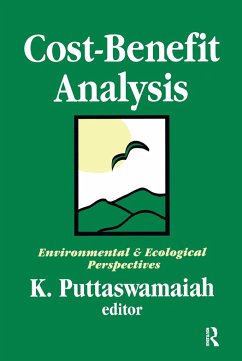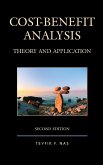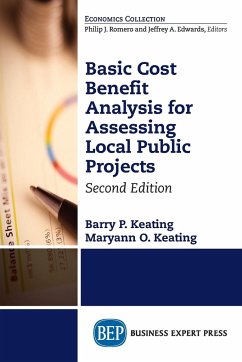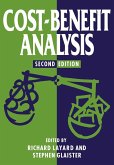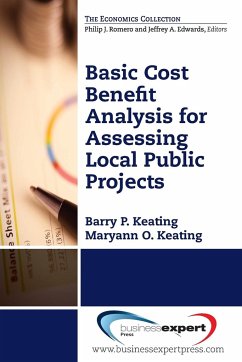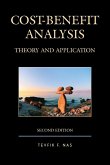- Gebundenes Buch
- Merkliste
- Auf die Merkliste
- Bewerten Bewerten
- Teilen
- Produkt teilen
- Produkterinnerung
- Produkterinnerung
With the establishment of a number of institutions for funding the projects including the World Bank, Asian Development Bank, and many other agencies, the need to develop mechanisms to assess economically viable projects is more important than ever.
Andere Kunden interessierten sich auch für
![Life cycle and cost-benefit analysis of industrial packaging material. A full evaluation of the environmental costs Life cycle and cost-benefit analysis of industrial packaging material. A full evaluation of the environmental costs]() David MeinelLife cycle and cost-benefit analysis of industrial packaging material. A full evaluation of the environmental costs49,50 €
David MeinelLife cycle and cost-benefit analysis of industrial packaging material. A full evaluation of the environmental costs49,50 €![Cost-Benefit Analysis Cost-Benefit Analysis]() Tevfik F. NasCost-Benefit Analysis121,99 €
Tevfik F. NasCost-Benefit Analysis121,99 €![Basic Cost Benefit Analysis for Assessing Local Public Projects, Second Edition Basic Cost Benefit Analysis for Assessing Local Public Projects, Second Edition]() Barry P. KeatingBasic Cost Benefit Analysis for Assessing Local Public Projects, Second Edition18,99 €
Barry P. KeatingBasic Cost Benefit Analysis for Assessing Local Public Projects, Second Edition18,99 €![Cost-Benefit Analysis Cost-Benefit Analysis]() Richard Layard / Stephen Glaister (eds.)Cost-Benefit Analysis42,99 €
Richard Layard / Stephen Glaister (eds.)Cost-Benefit Analysis42,99 €![Future of Composite Materials Future of Composite Materials]() Fouad SolimanFuture of Composite Materials36,99 €
Fouad SolimanFuture of Composite Materials36,99 €![Basic Cost Benefit Analysis for Assessing Local Public Projects Basic Cost Benefit Analysis for Assessing Local Public Projects]() Barry P. KeatingBasic Cost Benefit Analysis for Assessing Local Public Projects18,99 €
Barry P. KeatingBasic Cost Benefit Analysis for Assessing Local Public Projects18,99 €![Cost-Benefit Analysis Cost-Benefit Analysis]() Tevfik F. NasCost-Benefit Analysis58,99 €
Tevfik F. NasCost-Benefit Analysis58,99 €-
-
-
With the establishment of a number of institutions for funding the projects including the World Bank, Asian Development Bank, and many other agencies, the need to develop mechanisms to assess economically viable projects is more important than ever.
Produktdetails
- Produktdetails
- Verlag: Routledge
- Seitenzahl: 458
- Erscheinungstermin: 2. August 2017
- Englisch
- Abmessung: 235mm x 157mm x 29mm
- Gewicht: 809g
- ISBN-13: 9781138521322
- ISBN-10: 1138521329
- Artikelnr.: 49208593
- Herstellerkennzeichnung
- Libri GmbH
- Europaallee 1
- 36244 Bad Hersfeld
- gpsr@libri.de
- Verlag: Routledge
- Seitenzahl: 458
- Erscheinungstermin: 2. August 2017
- Englisch
- Abmessung: 235mm x 157mm x 29mm
- Gewicht: 809g
- ISBN-13: 9781138521322
- ISBN-10: 1138521329
- Artikelnr.: 49208593
- Herstellerkennzeichnung
- Libri GmbH
- Europaallee 1
- 36244 Bad Hersfeld
- gpsr@libri.de
James H. Meisel (Author) , K. Puttaswamaiah (Author)
1. Spatial General Equilibrium and Cost
Benefit Analysis
2. Optimum Growth Theory and Social Time Preference: A Computerised Mathematical Modelling Exercise to Choose a Social Discount Rate
3. A Theoretical Inquiry on the Axiomatic Consistency of Distributional Weights Used in Cost
Benefit Analysis
4. The Output Gap: Measurement, Related Concepts and Policy Implications
5. A Methodological Comparison of Theoretical Approaches in Dichotomous Choice Contingent Valuation
6. Cost
Benefit Analysis, Ethics and the Natural Environment 7. Transport Cost Analysis: Applications in Developed and Developing Countries
8. Cost
Benefit Analysis and the Evaluation of New Technology and Policies in Natural Resources
9. Cost
Benefit Analysis and the Environment: A Critical Assessment
10. The Limits of Economic Rationality: Social and Environmental Impacts of Recreational Land Use
11. Cost
Benefit Analysis and Wildlife Conservation: A Sustainable Application? 12. Cost
Benefit Analysis of Climate Change: Towards an Operational Decision Making Rule for Climate Change Policy
13. The Effect of Social Time Preference on the Future of the Australian Economy and Environment: Findings from the Australian Dynamic Integrated Climate and Economy Mode (ADICE)
14. An Economic and Environmental Assessment of Herbicide
Resistant and Insect/Pest
Resistant Crops
15. Spatial Discounting and the Environment: An Empirical Investigation into Human Preferences
16. The Free
Riding Behaviour in Culatra Island Case Study: Detection and Correction
17. The Cost of Wealthy Modern Cities 18. Valuing Multiple Health Risks from Long
Term Low Dosage Exposure to Hazardous Chemicals
19. Challenges and Pitfalls of Cost
Benefit Analysis in Environmental Issues
20. Challenges in Valuation: The Health Benefits of Reducing Air Pollutants
21. The Implications of Ecological Economic Theories of Value to Cost
Benefit Analysis: Importance of Alternative Valuation for Developing Nations with Special Emphasis on Central America
Benefit Analysis
2. Optimum Growth Theory and Social Time Preference: A Computerised Mathematical Modelling Exercise to Choose a Social Discount Rate
3. A Theoretical Inquiry on the Axiomatic Consistency of Distributional Weights Used in Cost
Benefit Analysis
4. The Output Gap: Measurement, Related Concepts and Policy Implications
5. A Methodological Comparison of Theoretical Approaches in Dichotomous Choice Contingent Valuation
6. Cost
Benefit Analysis, Ethics and the Natural Environment 7. Transport Cost Analysis: Applications in Developed and Developing Countries
8. Cost
Benefit Analysis and the Evaluation of New Technology and Policies in Natural Resources
9. Cost
Benefit Analysis and the Environment: A Critical Assessment
10. The Limits of Economic Rationality: Social and Environmental Impacts of Recreational Land Use
11. Cost
Benefit Analysis and Wildlife Conservation: A Sustainable Application? 12. Cost
Benefit Analysis of Climate Change: Towards an Operational Decision Making Rule for Climate Change Policy
13. The Effect of Social Time Preference on the Future of the Australian Economy and Environment: Findings from the Australian Dynamic Integrated Climate and Economy Mode (ADICE)
14. An Economic and Environmental Assessment of Herbicide
Resistant and Insect/Pest
Resistant Crops
15. Spatial Discounting and the Environment: An Empirical Investigation into Human Preferences
16. The Free
Riding Behaviour in Culatra Island Case Study: Detection and Correction
17. The Cost of Wealthy Modern Cities 18. Valuing Multiple Health Risks from Long
Term Low Dosage Exposure to Hazardous Chemicals
19. Challenges and Pitfalls of Cost
Benefit Analysis in Environmental Issues
20. Challenges in Valuation: The Health Benefits of Reducing Air Pollutants
21. The Implications of Ecological Economic Theories of Value to Cost
Benefit Analysis: Importance of Alternative Valuation for Developing Nations with Special Emphasis on Central America
1. Spatial General Equilibrium and Cost
Benefit Analysis
2. Optimum Growth Theory and Social Time Preference: A Computerised Mathematical Modelling Exercise to Choose a Social Discount Rate
3. A Theoretical Inquiry on the Axiomatic Consistency of Distributional Weights Used in Cost
Benefit Analysis
4. The Output Gap: Measurement, Related Concepts and Policy Implications
5. A Methodological Comparison of Theoretical Approaches in Dichotomous Choice Contingent Valuation
6. Cost
Benefit Analysis, Ethics and the Natural Environment 7. Transport Cost Analysis: Applications in Developed and Developing Countries
8. Cost
Benefit Analysis and the Evaluation of New Technology and Policies in Natural Resources
9. Cost
Benefit Analysis and the Environment: A Critical Assessment
10. The Limits of Economic Rationality: Social and Environmental Impacts of Recreational Land Use
11. Cost
Benefit Analysis and Wildlife Conservation: A Sustainable Application? 12. Cost
Benefit Analysis of Climate Change: Towards an Operational Decision Making Rule for Climate Change Policy
13. The Effect of Social Time Preference on the Future of the Australian Economy and Environment: Findings from the Australian Dynamic Integrated Climate and Economy Mode (ADICE)
14. An Economic and Environmental Assessment of Herbicide
Resistant and Insect/Pest
Resistant Crops
15. Spatial Discounting and the Environment: An Empirical Investigation into Human Preferences
16. The Free
Riding Behaviour in Culatra Island Case Study: Detection and Correction
17. The Cost of Wealthy Modern Cities 18. Valuing Multiple Health Risks from Long
Term Low Dosage Exposure to Hazardous Chemicals
19. Challenges and Pitfalls of Cost
Benefit Analysis in Environmental Issues
20. Challenges in Valuation: The Health Benefits of Reducing Air Pollutants
21. The Implications of Ecological Economic Theories of Value to Cost
Benefit Analysis: Importance of Alternative Valuation for Developing Nations with Special Emphasis on Central America
Benefit Analysis
2. Optimum Growth Theory and Social Time Preference: A Computerised Mathematical Modelling Exercise to Choose a Social Discount Rate
3. A Theoretical Inquiry on the Axiomatic Consistency of Distributional Weights Used in Cost
Benefit Analysis
4. The Output Gap: Measurement, Related Concepts and Policy Implications
5. A Methodological Comparison of Theoretical Approaches in Dichotomous Choice Contingent Valuation
6. Cost
Benefit Analysis, Ethics and the Natural Environment 7. Transport Cost Analysis: Applications in Developed and Developing Countries
8. Cost
Benefit Analysis and the Evaluation of New Technology and Policies in Natural Resources
9. Cost
Benefit Analysis and the Environment: A Critical Assessment
10. The Limits of Economic Rationality: Social and Environmental Impacts of Recreational Land Use
11. Cost
Benefit Analysis and Wildlife Conservation: A Sustainable Application? 12. Cost
Benefit Analysis of Climate Change: Towards an Operational Decision Making Rule for Climate Change Policy
13. The Effect of Social Time Preference on the Future of the Australian Economy and Environment: Findings from the Australian Dynamic Integrated Climate and Economy Mode (ADICE)
14. An Economic and Environmental Assessment of Herbicide
Resistant and Insect/Pest
Resistant Crops
15. Spatial Discounting and the Environment: An Empirical Investigation into Human Preferences
16. The Free
Riding Behaviour in Culatra Island Case Study: Detection and Correction
17. The Cost of Wealthy Modern Cities 18. Valuing Multiple Health Risks from Long
Term Low Dosage Exposure to Hazardous Chemicals
19. Challenges and Pitfalls of Cost
Benefit Analysis in Environmental Issues
20. Challenges in Valuation: The Health Benefits of Reducing Air Pollutants
21. The Implications of Ecological Economic Theories of Value to Cost
Benefit Analysis: Importance of Alternative Valuation for Developing Nations with Special Emphasis on Central America

